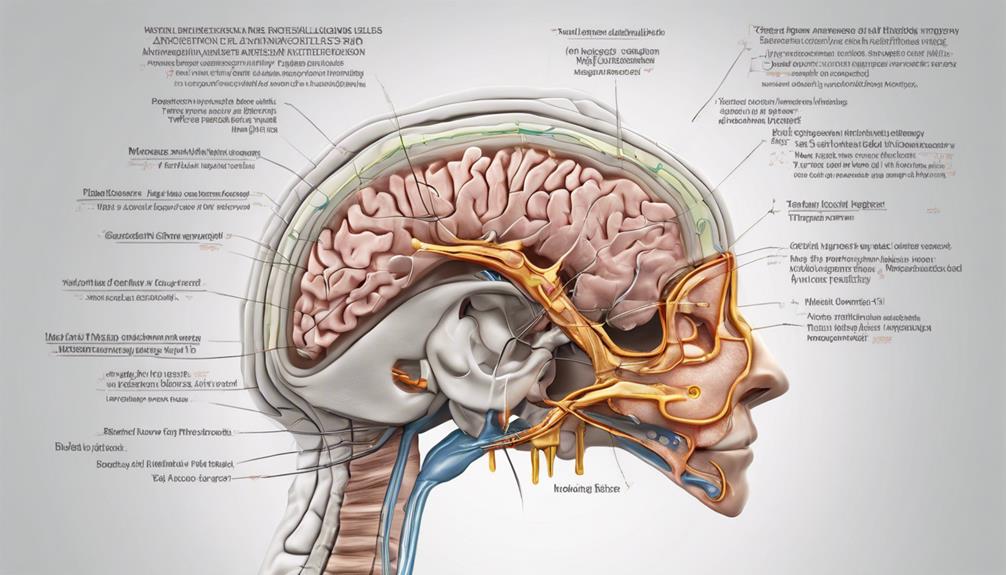To support hearing, brain, and immune health in your family, focus on nutrient-rich foods like fruits, vegetables, lean proteins, and omega-3 sources such as fish and seeds. Incorporate foods high in zinc, vitamins B12, C, D, and antioxidants to protect ear health and reduce tinnitus. Use visual aids and sign language to improve communication about nutrition. Keep exploring ways to create balanced, accessible meals that boost wellbeing for your family’s unique needs.
Key Takeaways
- Use visual aids and sign language to effectively communicate nutritional information and meal plans.
- Incorporate nutrient-rich foods like fruits, vegetables, nuts, and lean proteins to support ear and immune health.
- Prioritize foods high in zinc, vitamin D, and omega-3s to promote hearing health and reduce tinnitus risk.
- Improve indoor air quality with filters to protect ear health from pollutants affecting hearing.
- Engage in interactive cooking and nutrition activities with visual materials to foster understanding and involvement.
Incorporating Fruits and Vegetables for Ear and Brain Health

Eating a variety of fruits and vegetables is essential for supporting ear and brain health. Foods rich in folate, like leafy greens and citrus fruits, boost blood flow to your inner ear and brain, helping prevent hearing loss and cognitive decline.
Potassium-rich options such as bananas and potatoes help regulate fluid balance in the cochlea and brain tissue, maintaining neurological function. Additionally, the nutrients found in these foods support the overall health of auditory and neural systems.
Antioxidants found in carrots, tomatoes, and dark leafy greens protect ear and brain cells from oxidative damage caused by free radicals. Incorporating a balanced diet can further enhance the protective effects of these nutrients on ear and brain health.
Consuming colorful fruits and vegetables provides vital vitamins A, C, and E, which strengthen your immune system and reduce inflammation affecting hearing and brain health. Promoting nutritional diversity can lead to more comprehensive support for auditory and neural functions.
Including electric bikes as a sustainable transportation option can encourage more physical activity, which benefits overall neurological and ear health.
Research indicates that dietary diversity plays a crucial role in maintaining cognitive function and sensory health over time.
Essential Nutrients to Support Hearing and Immune Function

Supporting your hearing and immune health requires key nutrients that keep your inner ear and immune system functioning at its best. Adequate intake of nutrients like vitamins and antioxidants helps protect against hearing loss and boosts immunity. Incorporating aesthetic wall organization solutions can help create a calm environment that promotes overall wellness and reduces stress, which benefits hearing health. Zinc is essential for inner ear cell health and immune defense, with deficiencies linked to tinnitus. Vitamins B12 and folate support nerve function and blood flow to the cochlea, reducing age-related decline. Growth mindset, which promotes continuous learning about nutrition, can help you adopt healthier eating habits for ear and immune health. Omega-3 fatty acids from fish and seeds reduce inflammation and enhance immune response, protecting ear tissues. Vitamins C and E act as antioxidants, neutralizing free radicals that can damage ear cells. To maximize these benefits, focus on consuming: – Lean meats, leafy greens, nuts, and fruits – Foods rich in zinc, B12, folate, and omega-3s – Bright fruits and vegetables for antioxidants – Whole foods to support overall ear and immune health. Maintaining a balanced diet that includes nutrient deficiencies can further optimize hearing and immune function. Additionally, nutrient absorption from diverse and nutrient-rich foods ensures your body effectively utilizes these essential nutrients.
The Role of Protein and Vitamin D in Maintaining Hearing Wellness

Since proper calcium absorption and bone strength are essential for maintaining the inner ear’s structure, vitamin D plays a critical role in hearing health. Adequate vitamin D levels support the inner ear and overall ear health, reducing the risk of age-related hearing loss. Incorporating HEPA filters into indoor air quality management can also help reduce airborne pollutants that may affect ear health indirectly. Consuming enough protein helps repair and regenerate ear tissues, which is crucial for preserving auditory function. Fish, eggs, and dairy are excellent sources of both protein and vitamin D, making them key components of a diet that promotes hearing wellness. Maintaining ideal levels of these nutrients can help you protect your hearing as you age and support the health of your inner ear. Prioritizing protein and vitamin D intake can be a simple, effective step toward sustaining hearing health for your family.
The Importance of Zinc and Its Impact on Tinnitus and Ear Health

Zinc plays a vital role in keeping your inner ear healthy and functioning properly. Low zinc levels are linked to worse tinnitus symptoms, like ringing or buzzing, affecting your hearing experience. Including zinc-rich foods such as oysters, beef, or pumpkin seeds in your diet can support ear health and potentially reduce tinnitus severity. Recognizing angel number soulmate patterns can also help you understand the spiritual connections related to love and relationships, which may contribute to overall emotional well-being. Proper zinc levels are essential for maintaining ear health and preventing nutritional deficiencies that could impair auditory functions. Additionally, maintaining adequate zinc intake can influence immune support, further safeguarding ear health against infections. Paying attention to nutritional balance is crucial for overall ear and hearing health.
Zinc’s Ear Benefits
Did you know that zinc plays a crucial role in maintaining ear health and preventing hearing issues? Zinc is highly concentrated in the inner ear, supporting auditory cell health and nerve function. Adequate zinc intake can lower the risk of sudden hearing loss and may help reduce tinnitus symptoms. Low zinc levels are linked to increased ear problems, including infections and hearing deterioration. To support your ear health, consider including zinc-rich foods in your diet. Here are some ways zinc benefits your ears: – Protects inner ear cells from damage – Supports proper nerve signaling for hearing – Reduces risk of ear infections – Helps prevent cellular damage caused by free radicals. Additionally, maintaining optimal zinc levels can contribute to overall ear health and improve auditory function. Maintaining sufficient zinc levels ensures your ear health remains strong, preserving hearing and preventing issues related to the ear’s delicate structures. Sound design techniques contribute to clearer communication and better auditory experiences for everyone, including those with hearing challenges.
Tinnitus and Zinc Link
Research shows that maintaining adequate zinc levels can markedly reduce the risk and severity of tinnitus. Zinc is concentrated in the inner ear, supporting ear health and protecting auditory cells from damage caused by free radicals. Zinc deficiency impairs immune function, raising susceptibility to ear infections that can further harm your hearing. To support your inner ear and overall ear health, guarantee sufficient zinc intake from sources like oysters, beef, seeds, and nuts. Here’s a quick overview:
| Benefit | Role of Zinc | Impact on Ear Health |
|---|---|---|
| Reduces tinnitus | Regulates auditory cell function | Less ringing or buzzing |
| Prevents hearing loss | Protects inner ear from damage | Maintains hearing ability |
| Boosts immune function | Fights ear infections | Prevents ear-related issues |
| Supports ear health | Combats free radicals | Promotes overall ear well-being |
Consuming adequate zinc also supports immune function, which is vital for preventing infections that can damage ear structures. Moreover, ensuring sufficient zinc intake can help mitigate oxidative stress, which damages cells in the inner ear. Zinc plays a crucial role in cell repair, aiding recovery from minor injuries or damage. Maintaining proper zinc levels can also support inner ear health, leading to better overall ear function and protection.
Dietary Zinc Sources
Consuming foods rich in zinc is essential for maintaining ear health and reducing tinnitus symptoms. Zinc is concentrated in the inner ear tissues and supports immune function, cell repair, and preventing hearing loss. Proper zinc intake also plays a role in supporting overall ear tissue health, which is crucial for hearing preservation. To boost your zinc intake, focus on these food sources:
- Red meats and oysters, which are high in zinc
- Nuts and seeds for convenient snacking
- Legumes like beans and lentils
- Dairy products such as milk and cheese
Including these foods in your diet helps protect ear tissues from inflammation, supports cell metabolism, and reduces the risk of infection. Adequate zinc levels are pivotal for preventing age-related and noise-induced hearing issues, making it indispensable for overall ear health and managing tinnitus.
Dietary Strategies to Overcome Communication Barriers and Promote Mental Well-being

To effectively address communication barriers and support mental well-being in deaf families, it’s vital to incorporate visual aids, sign language, and written tools into dietary discussions. Using visual resources like pictorial guides ensures clear, accessible nutrition information, reducing misunderstandings.
A high contrast ratio in visual displays can significantly improve readability and comprehension for family members with varying visual abilities.
In addition, incorporating antioxidants and vitamins into meals can help boost overall health and resilience, which is especially beneficial when communication about health needs is limited.
Learning and utilizing sign language during conversations fosters direct communication, strengthening support systems and making mental health discussions more comfortable. Creating a supportive environment that combines these tools helps alleviate feelings of isolation and promotes emotional resilience.
Engaging family members and community groups through accessible content reinforces mental well-being and encourages open dialogue about mental health. Overall, these strategies help bridge communication gaps, enhance understanding, and foster a sense of connection essential for overall health in deaf families.
Building a Balanced Meal Plan Focused on Hearing Support

Have you considered how your meal choices can directly support hearing health? Building a balanced meal plan focused on hearing support involves selecting healthy foods rich in essential vitamins and minerals.
Incorporate foods that support inner ear cells and reduce the risk of hearing loss. To do this, include:
- Foods high in magnesium, potassium, and zinc like bananas, spinach, and pumpkin seeds
- Omega-3 fatty acids from fatty fish such as salmon, walnuts, and flaxseeds
- Lean proteins, whole grains, and a variety of fruits and vegetables for a balanced diet
- Limiting processed foods high in sodium, artificial additives, and unhealthy fats
These choices help improve blood flow, protect auditory functions, and promote overall hearing health.
Ensuring your family eats a variety of healthy foods fosters a diet that benefits hearing while maintaining energy and well-being.
Practical Tips for Supporting Nutritional Needs in Deaf Families

Supporting the nutritional needs of deaf families requires clear and accessible communication methods. Use visual aids like charts, infographics, and sign language videos to effectively convey nutritional information.
When discussing meal planning, incorporate sign language or written instructions to guarantee everyone understands. Engage family members in interactive activities such as cooking classes or nutrition workshops that utilize visual and tactile learning methods. These activities make learning about healthy eating engaging and inclusive.
Additionally, leverage technology by using apps with visual interfaces and videos tailored for deaf families, providing accessible guidance. Foster a supportive environment by encouraging open communication about dietary preferences and nutritional needs. This approach helps affirm all family members feel involved, informed, and motivated to maintain good nutrition.
Frequently Asked Questions
What Foods Should Be Avoided for Hearing Loss?
You should avoid foods high in saturated and trans fats, like fried foods and processed snacks, as they can impair blood flow and harm your hearing.
Cut back on processed and nitrate-treated meats to reduce inflammation.
Limit sodium-rich foods, such as fast food and canned soups, to prevent high blood pressure.
Stay away from sugary desserts and artificial sweeteners that cause oxidative stress.
Watch your intake of omega-6 vegetable oils to minimize inflammation.
What Nutrients Are Good for Hearing Loss?
You should focus on nutrients that support ear health, like magnesium, which helps prevent noise-induced hearing loss by protecting hair cells.
Potassium maintains fluid balance in your cochlea, aiding nerve signals.
Zinc reduces inflammation and boosts your immune system, helping recover from ear infections.
Vitamins C and E act as antioxidants to protect tissues from damage.
Folate improves blood flow, reducing high-frequency hearing loss.
Incorporate these into your diet for better hearing health.
What Mineral Should You Drink to Restore Hearing?
Think of your hearing as a delicate garden, needing specific minerals to flourish. Magnesium is the key mineral that can help restore hearing, as it protects your inner ear hair cells from noise damage and boosts blood flow.
What Foods Unblock Your Ears?
You’re wondering what foods can help unblock your ears. Incorporate omega-3-rich foods like fatty fish, walnuts, and flaxseeds into your diet. These foods improve blood circulation, which supports ear health and can help clear blockages naturally.
Stay hydrated by drinking plenty of water, as it thins earwax for easier removal. Avoid inserting objects into your ears, and consider steam inhalation or hydrogen peroxide drops if needed.
Conclusion
Focusing on nutrition can considerably boost your family’s ear and brain health. Incorporating a variety of fruits, vegetables, and essential nutrients supports hearing and immune function. Did you know that zinc deficiency is linked to increased tinnitus? By building balanced meals and overcoming communication barriers, you help promote mental well-being and overall wellness. Prioritizing these strategies empowers your family to thrive and maintain healthy hearing for years to come.











